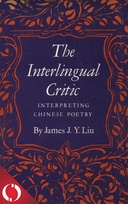Explore

A critical interpretation and evaluation of Chinese poetry for English-speaking readers , The Interlingual Critic is a sophisticated exploration of the poetic experience and the nature of translation and criticism. The book is an exercise in comparative poetics that contains elements of autobiography, the phenomenology of reading, the theory of translation, poetics, and hermeneutics, as well as practical criticism. Liu delineates a conceptual framework in which any theory of literature or poetics can be analyzed. This framework is based on the interrelations between world, author, work, and reader, and may be illustrated by a tetradic circle, which is repeated in the process of interpretation, with "critic " replacing "author." Liu goes on to discuss problems involved in reading, translating, interpreting, and evaluating Chinese poetry in an interlingual context. The theoretical discussion is followed by an exercise in practical criticism, in which examples of Chinese poetry are analyzed in terms of time-space-self interrelations, with some comparisons to Western poems. The Interlingual Critic represents a cogent and concise synthesis of Chinese and Western theories of literature that will interest critics and students of other national literatures as well as specialists in Chinese poetry.
This book is included in DOAB.
Why read this book? Have your say.
You must be logged in to comment.
Editions

